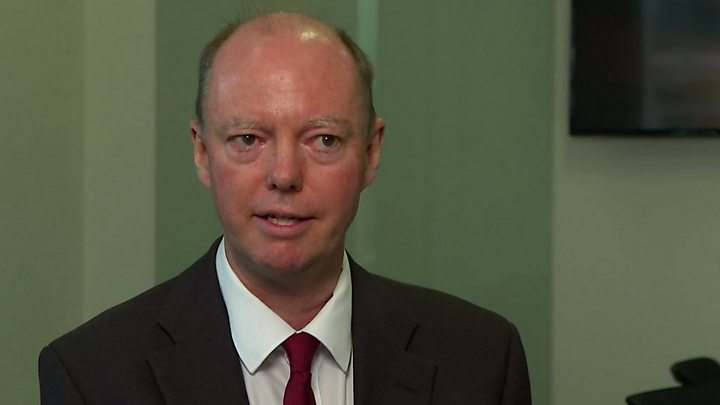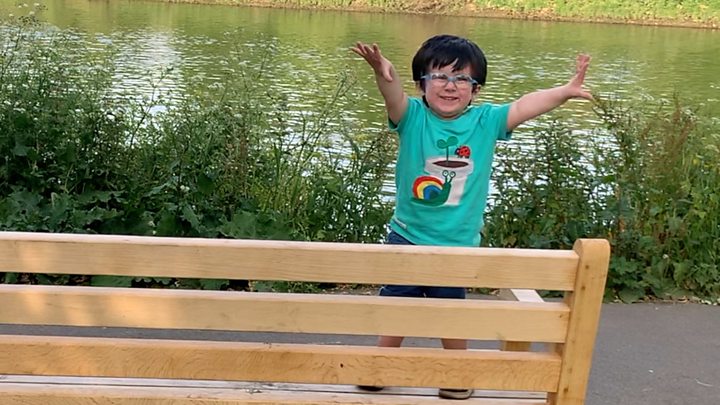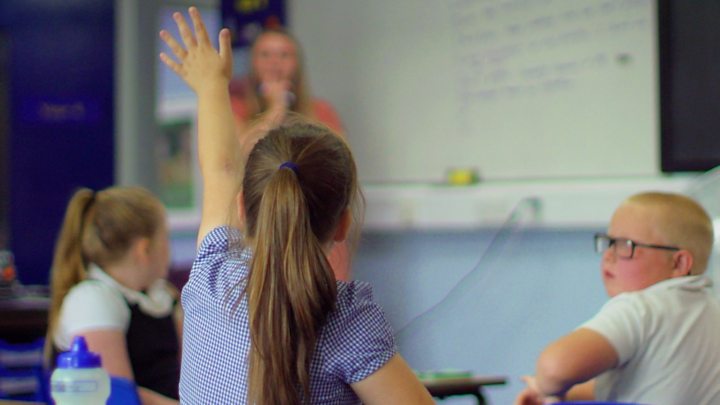
Media playback is unsupported on your device
Children are more likely to be harmed by not returning to school next month than if they catch coronavirus, the UK’s chief medical adviser says.
Prof Chris Whitty said “the chances of children dying from Covid-19 are incredibly small” – but missing lessons “damages children in the long run”.
Millions of pupils in England, Wales and Northern Ireland are due to return to school within weeks.
Prof Whitty also said Covid-19 would be a challenge for at least nine months.
He said it was unlikely there would be a vaccine in 2020 but there was a “reasonable chance” of a working jab being ready for the following winter in 2021-22.
Speaking about the balance of risks for pupils, Prof Whitty, who is also England’s chief medical officer, said it was “very strongly in favour of children going to school because many more were likely to be harmed by not going than harmed by going”.
“There’s also very clear evidence from the UK and around the world that children much less commonly get a severe illness and end up having to be hospitalised if they get symptomatic Covid,” he added in an interview.
The government has said all pupils, in all year groups, in England will be expected to return to class full-time in September. Schools have already reopened in Scotland.
It came as chief and deputy chief medical officers for all four UK nations said there were “no risk-free options” and it was important for parents and teachers to understand both the risks and benefits as schools reopen.
Image copyright
Getty Images
Table Of Contents
What’s the message for parents?
Prof Whitty used his interview to explain that – on balance – the effect on children of not attending lessons was far greater than if they were to be infected by the coronavirus.
“The evidence that not going to school damages children in the long run is overwhelming,” he said.
“And that includes their long-term chances, it increases the risks of disparities, it entrenches deep-rooted problems that people may have, it increases the risk that they have mental and physical ill health in the long run.”
Image copyright
Reuters
Protective measures like distancing, hand washing and cleaning can reduce risks, Prof Whitty said
He said there was also “clear evidence” that the chances of children dying from Covid-19 were “incredibly small” – and that the great majority of children who died with the virus had “very serious health conditions”.
According to the Office for National Statistics’ latest data on ages, there were 10 deaths recorded as “due to Covid-19” among those aged 19 and under in England and Wales between March and June – and 46,725 deaths among those aged 20 and over.
“The chances of children catching Covid and then getting long-term serious problems as a result of it, solely due to going to school, are incredibly small,” Prof Whitty added. “They’re not zero, but they’re incredibly small.”
With his message that the chances of children getting seriously ill with Covid-19 due to being at school were incredibly small, Prof Chris Whitty was speaking officially on behalf of all the chief medical officers of the UK’s nations.
But this rare interview reveals a lot more about his own views on how the virus is developing.
More parents going back to work with schools reopening will probably, he believes, increase virus transmission and that may require restrictions in other areas.
He says people need to accept that, with autumn and winter, the pressures will increase.
He refers to “an incredibly narrow path” to be walked to protect people from the virus without further damage to the economy, meaning there is “not very much room for manoeuvre”.
If the virus picks up among younger adults, he argues, that can spread to older and more vulnerable age groups. His conclusion is that there is a really serious challenge for at least another nine months.
This is a chief medical officer who seems unlikely to back further easing of restrictions and to be ready to propose tightening if that is the price which has to be paid for the vitally important goal of getting children back to school.
Will children spread the virus to grandparents?
Prof Whitty said it looked as if “there is much less transmission from children to adults than adults to adults”.
He said reopening schools would connect households in other ways – for example as parents meet at the school gate and as they are able to return to work.

Media playback is unsupported on your device
“The fact of schools being open will probably lead to some increase in transmission but much of that is indirect,” he said.
“It’s not so much the children passing it on but the fact that schools are open allows more mixing of adults in the workplace and in other environments.”
But the World Health Organization has said children aged 12 and over should wear masks in line with national recommendations citing evidence suggesting teenagers can infect others in the same way as adults.
And a school in Edinburgh has told pupils and staff to wear face coverings while moving around between lessons.
Are school staff at risk?
Data shows that staff spreading the virus to other members of staff is “maybe actually more important than staff members catching it from pupils”, Prof Whitty said.
He said that – much like other workplaces – “it is staff coming together and spreading it to one another” that can drive infections.

Media playback is unsupported on your device
“I think schools and particularly teachers have done a huge amount to try and do everything they can to minimise the risk of transmission in schools,” he added.
“Even with the best actions, you cannot take that down to zero and we’re really clear about that and we don’t want to pretend otherwise.”
However, he stressed that enhanced cleaning and hand washing could “significantly reduce transmissions in schools”.
Can schools ever be completely safe?
In Scotland, where pupils returned to classrooms this month, there has been criticism from pupils and parents about safety measures and the ability to maintain social distancing.
Prof Whitty said it was possible to reopen with measures to “reduce transmission [and] to be very confident that children are very unlikely to come to long-term medical damage” due to Covid-19.
Social media pictures show pupils sitting close to each other at schools in Scotland
He added staff could be protected by having hygiene and cleaning measures in place, but warned “we cannot say the risk will be taken down to zero as we cannot say that in any work place”.
Primary school headteacher Paul Jackson told the BBC he felt reopening would lead to an “inevitable” rise in cases.
“But what we’ve got to do is we’ve got to keep schools open, and we need to keep children safe and therefore as a society we all need to take some responsibility,” he said.
Mr Jackson’s school in east London will reopen with measures including additional entrances and exits, staggered start times, extra cleaning, and signage to encourage social distancing.
The NASUWT teachers’ union said the importance of social distancing and hygiene had been reinforced by the chief medical officers’ statement.
But it urged more guidance from the government over racial disparities linked to Covid-19.
What about the R number?
The latest government estimate saw the R number – the rate at which an infected person passes on the virus to someone else – rise to 0.9-1.1, meaning infections may be growing.
On Saturday, the government said there had been 1,288 newly-confirmed cases.
Prof Whitty said that – at the moment – infections in some areas were going up and going down in others.
Image copyright
PA Media
Oldham is one of the areas seeing an increase in virus infections
“But the expectation is that with schools coming back, with autumn and then winter coming in, the pressures are going to increase so we have to plan for the possibility that the transmission rate will start to rise,” he said.
When will this be over?
Prof Whitty said he would be “quite surprised if we had a highly effective vaccine ready for mass use in a large percentage of the population before the end of winter, certainly before this side of Christmas”.
Admitting this may turn out to be pessimistic, he said there was a huge amount of effort going in to developing a working vaccine “at extraordinarily fast speed”.
But he added: “I do want to be really clear, even with all the information we have got now, even with all the tools we have at our disposal now, we have still got a really serious challenge of coronavirus for at least the next nine months.”